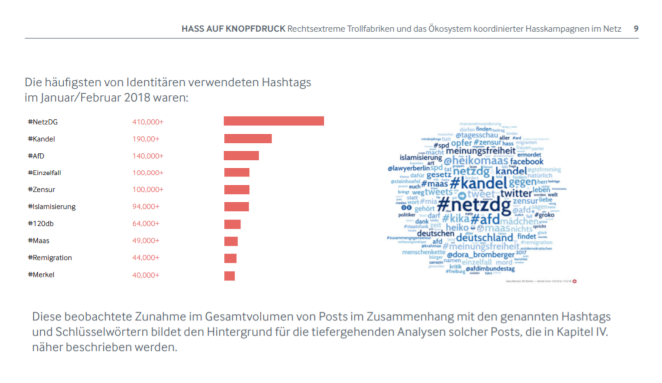New research analyses impact of far-right campaigns in Germany following introduction of hate speech law

5 July 2018, Berlin: A new study released today from the Institute for Strategic Dialogue (ISD) and campaign group Ich Bin Hier, maps the rise and nature of far-right hate speech in Germany, since the introduction of the NetzDG law in October last year.
The analysis of more than 1.6 million far-right posts on social media between February 2017 and February 2018 shows that while explicitly racist, anti-Muslim and anti-Semitic posts have decreased since the NetzDG came into effect in October 2017, coordinated far-right online hate campaigns such as #120db, #kikagate and #kandelistueberall have been three times as frequent (c. 300,000 posts per month up from c. 90,000 posts per month).
The study reveals that this increase in hate speech is not representative of a wider societal shift but driven by a loud minority of far-right campaigners. The evaluation of 700 posts, 16,830 comments and 1.2 million ‘Likes’ shows that 5% of active users were responsible for 50% of all engagement with hateful far-right content online, and less than 1% of users were responsible for 25% of these interactions.
These users have created a well organised, coordinated ‘troll army’ using sophisticated media strategies to spread hate campaigns online. Tactics include targeted trolling of political opponents, coordinated hijacking of hashtags, spamming of major comment sections and creating multiple parallel accounts.
The study highlights that the impact of these online campaigns is felt well beyond social media ‘echo chambers’, influencing media reporting and even policy decisions in Germany. By amplifying certain hashtags and campaigns until they are ‘trending’ on social media, far-right groups are able to push these topics into the mainstream. Researchers identified how campaigns such as #120db were initially picked up and amplified by online bots, then shared by Alternative for Germany (AfD) accounts and Russian media outlets like RT and Sputnik, with some going on to feature in mainstream German media outlets.
Julia Ebner, Researcher at ISD and one of the report’s authors comments: “It is important that neither journalists or politicians assess national sentiment based purely on interactions and opinions expressed on social media. This research clearly identifies how only a limited number of individuals posting from multiple profiles are able to create a false impression of wide societal rage, which in reality does not exist. Whilst social media analysis can capture interesting social discourse, this should be combined with traditional polling data and comprehensive public surveys.”
The study also highlights the role individuals can play in combating hate speech online, by supporting victims of hate-campaigns and championing respectful discourse online independent of one’s personal and political views.
Ebner adds: “Based on our results, we are using tech tools to develop early warning systems, which will be able to quickly identify the build-up of hateful posts on social media. This will allow us to enable coordinated counter-campaigns to protect NGOs, activists, journalists, and other internet users from online-attacks.”
